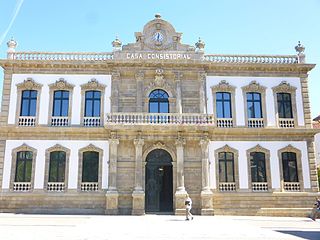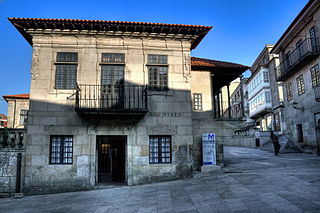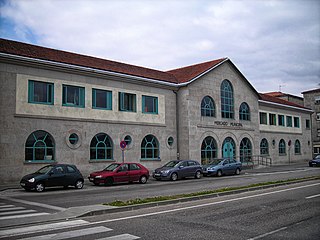
The church of the Pilgrim Virgin is a scallop-shaped chapel located in the city of Pontevedra, in Spain, along the route of the Portuguese Way of St. James.

The Pontevedra City Hall in Pontevedra, Spain, is the seat of the city council of this Galician city. It is located at the eastern end of the Alameda de Pontevedra, on the edge of the old town. To the west it opens onto the pedestrian España Square.

The Casa de las Campanas is one of the three oldest buildings in the city of Pontevedra in Spain, and perhaps the oldest civil building. It is located in Don Filiberto street, at number 11, in the old town.

The Palace of the Deputation of Pontevedra, in Pontevedra, Spain, is the seat of the Provincial Deputation of Pontevedra, the provincial government of the province of Pontevedra. It is located between the Alameda de Pontevedra and the Palm Trees Park.

The Palm Trees Park, also known simply as Las Palmeras, is a public park in the heart of Pontevedra in Spain. It is the most representative and emblematic green space in the city centre, together with the Alameda de Pontevedra.

The Our Lady of Placeres church is a Catholic church in the municipality of Pontevedra, Galicia, Spain. The church was built at the end of the 19th century in neo-Gothic style.

The Mendoza mansion is a building located between Santa María Avenue and Arzobispo Malvar Street, at the western end of the old town of Pontevedra. It is currently the headquarters of the Rias Bajas Tourist Office.

The Principal Theatre of Pontevedra (Teatro Principal de Pontevedra) is a theatre in the old town of Pontevedra (Spain).

The building of the former Pontevedra Normal School of Pontevedra, in Pontevedra, Spain, is an eclectic building from the end of the 19th century that was the headquarters of the teacher training college of this Galician city. It is located on the Gran Vía de Montero Ríos, between the Alameda de Pontevedra and the Palm Trees Park.

The Pazo de Castro Monteagudo, is an 18th-century baroque pazo in Pasantería Street, next to the Plaza de la Leña in the city of Pontevedra, Spain, in the heart of the old town.

The Bank of Spain building is an eclectic early-20th-century building in the Spanish city of Pontevedra.

The Plaza de la Verdura is a square of medieval origin located in the heart of the historic centre of Pontevedra (Spain). It is one of the liveliest medieval squares in the city.

The Central Market of Pontevedra is a covered market located in Pontevedra, Spain. It is located at the north-eastern edge of the historic centre, close to the Burgo Bridge. It overlooks the banks of the Lérez river and was inaugurated in 1948.

The Plaza de la Pedreira or Plaza de Mugartegui is a square of medieval origin located in the northern part of the old town of Pontevedra (Spain).

Curros Enríquez Square is a square of medieval origin located in the heart of the historic centre of Pontevedra (Spain), on the Portuguese pilgrimage way.

The Marquis of Riestra's mansion is an eclectic building with art Nouveau elements from the late 19th century located at 30 Michelena Street in Pontevedra, Spain. It currently houses the main central administrative services of the City Council of Pontevedra.

The Sanctuary of the Apparitions is located in Pontevedra, Spain. According to Sister Lúcia, it was here that the child Jesus and the Virgin Mary appeared to her in December 1925 with Mary's heart surrounded by thorns and revealed to her the First Saturdays Devotion. Lúcia also said that the child Jesus visited her alone in February 1926, near the sanctuary's garden, to urge her to do more to promote the five Saturdays Devotion.

The Chapel of the Nazarene is a Catholic religious building, with the status of chapel, located in the old town of Pontevedra (Spain), in Duque de Tetuán Street, opposite the Principal Theatre.

The former Saint Ferdinand Barracks in Pontevedra, is a large neoclassical building from the beginning of the 20th century located in the centre of Pontevedra (Spain), opposite the Doctor Marescot Gardens and very close to the Alameda de Pontevedra.

The Gran Vía de Montero Ríos is an avenue in Pontevedra (Spain) located in the city centre, in the 19th century bourgeois area. It is one of the most emblematic avenues in Pontevedra.





















